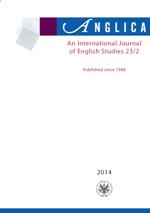Reflexivity in Old English
Reflexivity in Old English
Author(s): Sylwia PielechaSubject(s): Language and Literature Studies
Published by: Wydawnictwa Uniwersytetu Warszawskiego
Keywords: reflexive verbs; reflexivity; intensifier; inherent verbs; reflexive pronoun; co-referential pronouns
Summary/Abstract: The paper discusses changes that took place in the ways of expressing reflexivity in Old English. The study examines and evaluates the two most common forms conveying reflexivity: the use of personal pronouns and the reflexive pronoun self. The Early Old English personal pronouns were able to convey a reflexive relation, but, probably in order to avoid ambiguity, the personal pronoun began to be accompanied by the pronoun self in sentences rendering a reflexive meaning. The paper also contains an account of self used on its own, which was mostly employed in structures with emphatic meanings. Moreover, the work will adduce an example of an Old English inherently reflexive verb. The data come from the Dictionary of Old English corpus.
Journal: ANGLICA - An International Journal of English Studies
- Issue Year: 23/2014
- Issue No: 2
- Page Range: 53-62
- Page Count: 10
- Language: English

